#flaxseed for cancer
Explore tagged Tumblr posts
Text


Full Moon x Pick A Card : What you need to hear 📝🌛
Some channeled messages that this full moon’s energy brings to the collective. All specific and general details are meant for a certain part of the collective. Take what resonates, leave what doesn’t and if you are drawn to more than one pile feel free to read them! Let me know if it resonates. 👒

pile 1
angel number : 555 | song : blooming today by sung ki kyung
hello, pile 1! i see you have had an exhausting cycle. some of you have been identifying with external conflicts and the sludge of other people’s projections with your own vibe. this group is either young, or sheltered. or you may have limited interactions with the world. holding and understanding pain is not your purpose right now. if you have been tangled with other people’s shadows or confronting their unhealed behaviour, remember to take due care of yourself. i hear, “drop the anchor”.
you need a little more muscle and structure in you, to not be blown away by things you dislike or bring disturbance. we can’t avoid being agitated or moved by the currents of life, but you also need to find stillness so that, you are able to receive the wisdom that comes out of situations which are ‘threatening’. how will you find this stillness?
deep, regulated, conscious breathing. the one thing you have been doing, since you came into this world, it is the one thing connecting us within. and regulating our functions from the chaos.
some of you have artistic abilities and talent. you are called to explore any creative medium during this cycle. this stage of your life calls for introspection and exploration of your creative side. creating a sanctuary, a paradise for yourself is closer to your life’s purpose.
“curation”, im hearing that word a lot. curation of knowledge and resources. in this cycle, you will be provided with opportunities to expand and learn. you’re called to deepen your understanding of yourself. you need a ‘base’ to work on and have a footing in this world. don’t be afraid to be a beginner, a learner. the roots need to go deep to ensure your growth and survival, and to keep the flower above the ground blooming.
masterlist

pile 2
angel number : 1111 | song - antenna by hyukoh, 落日飛車, sunset rollercoaster
you feel restless pile 2. im channeling the placements for sun in taurus, moon in pisces, saturn in cancer/virgo and north node/8h scorpio. if it doesn’t resonate with your placements, that’s alright, it is only a specific vibe i got for some of you. i was told, “your quest, your mission is on its way.”
some of you are recovering from ill health. im hearing you need more of omega-3, so include some tuna, mackerel, flaxseeds, chia, walnuts and edamame beans in your diet, whatever your preferences may be.
i feel a lot is going at the mind and body level - maybe, anxiety, you’re in need of fresh air and good ventilation, maybe even a clean-up of your surroundings. there could be a change of scenery, traveling, it could even be a short-term movement.
why am i channeling so many things for you?
you could be at a crossroads. preparing to enter a transformational phase. for this reason, you are looking for answers and the universe wants to tell you : the answer is now, the answer is you.
you have worked on something for a long time. and you are getting close to its fruition. you may not have noticed how much you have grown during this journey. what a wonderful job! the universe is so proud of you!
you have come a long way and with all the challenges you have overcome, you have also acquired all those skills. it feels like you have absorbed the know-how and have it in your inventory.
keep being in the flow, soften your mind, keep reminding yourself that you have got this. your dream is closer than you know. this is a moment to rest and refine, that is all.
masterlist

pile 3
angel number : 1221 | song : pined for you my whole life by matt maltese
there is wonderful news on the horizon for you pile 3. you guys have such a charming and dreamy energy. such romanticists. why do i feel some of you are being pursued or courted? there is a cloud of pining around you!
now the message coming through for you is that you gotta not be so slippery lol. why are you putting so much energy into daydreaming and pining when you have people for you, willing to lay themselves at your feet? you have the opportunity to live out your fantasies, so what are you waiting for?
ah, the comfort of your imagination is hard to leave? i get it, pile 3. believe it or not, you coy mfs make it hard for some people to live and breathe. it is not just the case of desire but the gift of being able to connect with you, genuinely.
and because you are so blessed with intelligence, you know who is good for you. you know who complements your energy, and this person is itching to spoil you.
give yourself the permission to be seen. vulnerability is challenging and you are allowed to take baby steps. and you don’t even need to initiate, it seems. i hear “don’t complicate it, keep it simple, simple is so attractive”.
on a more general note, i hear how “blessed” you are and how “lucky”. you are mostly grateful and don’t take things for granted. so, it creates these ripples where things come to you “with ease”. maybe your own personal efforts could be dismissed, or the hurdles be discounted from your achievements.
you may have to deal with expectations or people diminishing your success. that invalidation is really uncalled for. don’t use that excuse to undervalue what you do, okay?
validation is only an added bonus, people are not always qualified or observant or compassionate.
a lot of this pile’s wounds seem to be related to wanting to be recognized. we were never meant to be alone, afterall. you will always be the first witness to your journey.
i recommend journaling. there are a lot of ways to go about documenting your life and you can look for less effort-intensive ways. “one line” journals are also helpful. you can even record your own voice narrating a week or a month in your life.
there is no need to be ashamed of your achievements, pile 3. people will learn to recognize it in due time but in the meanwhile, keep going and celebrate with the ones who DO recognize and cherish you.
masterlist

pile 4
angel number : 1010 | song - the flood by aurora
have you parted ways with someone who meant a lot to you? im sorry my dear, pile 4. i know how much they meant to you, and vice versa. you each carry so much of the other’s love and quirks. yeah, you guys seem inseparable. in fact, this break may be necessary for you to look at the world and take a breather from the expectations and influences of each other. to some of you, this break can even bring peace or a different perspective. i’m getting that this is a professional break. maybe one or both of you could be exploring opportunities, pursuing a career or work that has placed a lot of demands in a way that has led to this separation.
im a little confused with the contrast because, i sense this loyalty and connection, but also sadness. for one group, it is possible you will both do your own thing for a while. this connection is one of a kind and i do see reunion of sorts on the cards. you both have so far had the front seat privilege of cheering each other, witnessing the highs and the lows. this period will be a reset. if you are seeking reassurance, i hear better days are coming.
for another group, you will sort of realise this person was idolised and now you will be able to drop that idea. if they have triggered you, this will be an opportunity to reflect on it. the other person is also going through an important lesson, and i hear the word ‘illusion’. it is possible if you guys ever do make the decision of reuniting, you will drop any illusion, or be more honest and clear with your communication.
this theme also extends to the rest of your own identity. you are thirsting to know what is ‘real’, and what is ‘true’. you want to slither between the gaps and know things on an intimate level. you want to savour this world in its raw form. how delightful. this could be the start of something new. a new pathway forming in your brain, the way you see and connect with the outer world.
are your interactions merely reactive, or are they coming from a place of curiosity, wanting to understand better. are you in a glass wall, only seeing the other person from within a closed space, or can you see the light dancing in their eyes and the weight they place behind certain words? these are the questions, the energy of this full moon prompts you.
masterlist

dividers by @strangergraphics
#tarot pac#pac#pick a card reading#pick a card#full moon#pick a card tarot#intuitive tarot reader#tarotblr#daily astrology#scorpio
193 notes
·
View notes
Text
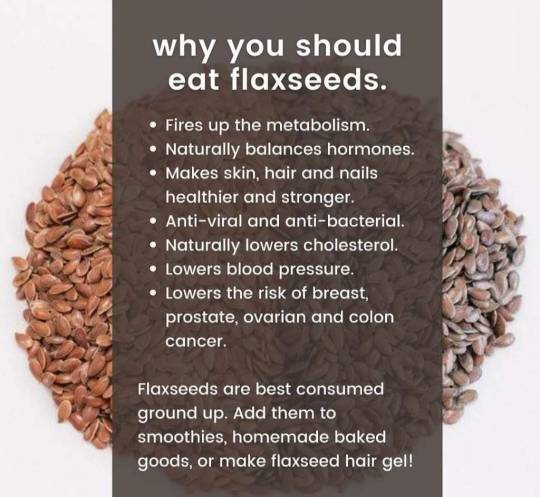
Flaxseeds have been consumed for over 6,000 years. These magical seeds contain anti-inflammatory omega-3 fatty acids and other antioxidants that naturally promote hormonal balance, and improve digestion, strengthen hair and nails, and even fight cancer!
Flaxseeds are small seeds, often called Lin seeds, that are a great source of dietary fiber and other minerals like manganese and magnesium. They’re also a great source of plant-based protein.
We love adding flaxseeds to baked goods, smoothies, and even to our homemade hair gel/treatment mask. I’d recommend grinding them up (instead of eating them whole) to reap the most benefits.
Do you eat flaxseeds often? How do you use them?
22 notes
·
View notes
Text
The Ultimate Guide to Golden Retrievers: Everything You Need to Know!

So, you’re thinking about getting a Golden Retriever? Or maybe you already have one and just want to learn more about this lovable, floppy-eared goofball. Either way, you’ve come to the right place! Goldens are one of the most popular dog breeds in the world—and for good reason. Let’s dive into everything you need to know before bringing one into your life.
Breed Size & Weight
Golden Retrievers are a medium-to-large breed.
Males typically weigh between 65-75 lbs and stand 23-24 inches tall at the shoulder.
Females are a bit smaller, weighing 55-65 lbs and standing 21.5-22.5 inches tall.

Lifespan
Golden Retrievers have an average lifespan of 10-12 years. Some may live longer with excellent care, a proper diet, and regular exercise.
Coat & Color Variations
Goldens have a double coat, meaning they have a thick, water-resistant outer coat and a soft undercoat. Their fur is medium to long in length and can be:
Light golden
Standard golden
Dark golden
They also have feathering on their legs, chest, and tail, which gives them that signature fluffy look!

Personality
If you’re looking for a friendly, affectionate, and social dog, Goldens are one of the best! They are:
Extremely loyal and people-oriented
Gentle and loving with families
Playful and energetic
Known for their enthusiastic, happy demeanor (a Golden smile is a real thing!)

Training
Golden Retrievers are highly intelligent and eager to please, making them easy to train. They excel in obedience, agility, and even service work. Start training early and use positive reinforcement (treats, praise, playtime) for best results.
Are They Good Guard Dogs?
Not really. Goldens are too friendly to be effective guard dogs. While they may bark to alert you, they are more likely to lick an intruder than scare them away!

Are They Good with Kids?
Absolutely! Goldens are one of the best family dogs you can get. They are patient, gentle, and playful, making them perfect for households with children.

Nutrition
Goldens thrive on high-quality dog food that contains lean proteins, healthy fats, and essential nutrients. Watch their portion sizes, as they are prone to weight gain.
Foods to include:
Lean meats (chicken, beef, fish)
Vegetables (carrots, spinach, sweet potatoes)
Healthy fats (salmon oil, flaxseed)
Foods to avoid:
Chocolate, grapes, onions, and anything toxic to dogs
Excessive carbs or fillers

Exercise Requirements
Goldens are high-energy dogs that require at least 1-2 hours of exercise per day. Without proper exercise, they can become bored and destructive. Activities they love include:
Fetch
Swimming
Hiking
Running
Agility training

Common Health Problems
Like all breeds, Goldens have some common health concerns, including:
Hip & elbow dysplasia (joint problems)
Cancer (unfortunately common in the breed)
Ear infections (due to their floppy ears trapping moisture)
Obesity (if diet & exercise aren’t managed properly)
Regular vet checkups can help catch any issues early!

Do They Bark a Lot?
Goldens aren’t excessive barkers, but they will bark to alert you or when they’re excited. With proper training, barking can be managed.
Grooming
Golden Retrievers require regular grooming to keep their coats healthy and prevent matting.
Brush them 2-3 times a week (daily during shedding season!)
Bathe them once a month or as needed
Trim their nails regularly
Check their ears weekly for signs of infection

Shedding
Yes, Goldens shed a lot! They blow their coats twice a year (spring and fall), but you can expect shedding year-round. Regular brushing helps manage the fur explosion.
Space Requirements: Are They Apartment Dogs?
Goldens can adapt to apartment living, but they thrive best in homes with a yard. If you live in an apartment, be prepared to take them out for frequent exercise and mental stimulation.

Do They Drool?
Not as much as some breeds, but Goldens can drool, especially after drinking water or when waiting for food.
Litter Size
Golden Retriever litters typically range from 6-10 puppies per litter.

Are They Smart?
Yes! Goldens are ranked among the top 5 smartest dog breeds. They learn commands quickly and excel in obedience training.
Temperament
Golden Retrievers are gentle, affectionate, playful, and social. They are rarely aggressive and are known for their trusting, happy-go-lucky nature.

Pros & Cons of Owning a Golden Retriever
Pros: ✅ Loving and loyal ✅ Great with kids and families ✅ Highly trainable and intelligent ✅ Adaptable to various lifestyles ✅ Fun, playful, and energetic
Cons: ❌ Heavy shedders (get ready for fur everywhere!) ❌ Require lots of exercise and mental stimulation ❌ Prone to health issues like hip dysplasia and cancer ❌ Not great guard dogs (too friendly!)

Final Thoughts
Golden Retrievers are one of the best dog breeds out there—loving, intelligent, and full of life. However, they do require commitment, exercise, and lots of love. If you’re ready for the responsibility, a Golden will reward you with years of joy, companionship, and unconditional love. 💛
Thinking about getting a Golden Retriever? Already have one? Let me know in the comments! 🐶
#GoldenRetriever#GoldenRetrievers#DogLovers#PuppyLove#GoldenLife#DogsOfTumblr#DogBreeds#DogTraining#DogCare#FluffyDog#RetrieverLife#GoldenRetrieverPuppy#PetCare#DogMom#DogDad#FurryFriend#BestFamilyDog#DogLover#DogGrooming#SheddingSeason
3 notes
·
View notes
Text
Comprehensive Benefits of a Plant-Based Diet: Health, Environment, and Beyond

Adopting a plant-based diet can have numerous benefits for your health, the environment, and animal welfare. Here’s a detailed breakdown:
Health Benefits
Improved Heart Health
Plant-based diets are rich in fiber, antioxidants, and healthy fats, which help lower LDL (“bad”) cholesterol and blood pressure.
Reduces the risk of heart disease, stroke, and hypertension.
Weight Management
Plant-based diets tend to be lower in calories and high in fiber, promoting satiety and aiding weight loss or weight maintenance.
Studies show that vegetarians and vegans often have lower body mass indices (BMIs).
Reduced Risk of Chronic Diseases
Lower incidence of type 2 diabetes: Whole grains, legumes, and vegetables regulate blood sugar levels.
Reduced cancer risk: Diets high in fruits, vegetables, and legumes contain antioxidants and phytochemicals that combat cancer.
Lower inflammation: Plant-based diets reduce chronic inflammation linked to arthritis, autoimmune conditions, and other illnesses.
Better Digestive Health
High fiber content supports gut health, promotes regular bowel movements, and prevents constipation.
Encourages a diverse gut microbiome, which is linked to improved immunity and mental health.
Longevity
Studies suggest that plant-based diets are associated with a longer lifespan due to the reduced risk of chronic illnesses.
Improved Mental Health
Nutrients like magnesium, folate, and antioxidants found in plant-based foods are associated with better mood regulation and reduced symptoms of depression.
Enhanced Nutrient Intake
A plant-based diet is rich in essential vitamins (e.g., C, E, and folate), minerals (e.g., potassium, magnesium), and phytonutrients that boost overall health.
Antioxidants in plant foods neutralize free radicals, reducing cellular damage and slowing aging processes.
Improved Bone Health
Contrary to common misconceptions, plant-based diets can support strong bones through calcium-rich foods like fortified plant milks, tofu, almonds, and leafy greens.
Plant-based sources of magnesium and potassium improve bone density.
Reduced Risk of Neurodegenerative Diseases
Diets high in vegetables, fruits, nuts, and seeds have been linked to a lower risk of Alzheimer’s disease and cognitive decline.
Omega-3 fatty acids from plant sources like flaxseeds, chia seeds, and walnuts support brain health.
Boosted Immune System
Plant-based foods contain immune-supporting vitamins (e.g., vitamin C from citrus fruits) and zinc from legumes, nuts, and seeds.
Improved Skin Health
High intake of water-rich foods like fruits and vegetables hydrates the skin.
Antioxidants (e.g., beta-carotene in carrots, and lycopene in tomatoes) help reduce acne, prevent sun damage, and promote a glowing complexion.
read full article only at https://fitnessproguru.com/healthy-diet/comprehensive-benefits-of-a-plant-based-diet-health-environment-and-beyond/
#fitness#fitnessmotivation#healthcare#health & fitness#health and wellness#mental health#vegan#veganfood#go vegan
4 notes
·
View notes
Text
EAT HEALTHY BE HEALTHY
SEEDS
Seeds are tiny powerhouses packed with nutrients and offer numerous health benefits. Here are some of the top seeds you might consider adding to your diet:
Flaxseeds: Rich in fiber and omega-3 fatty acids, flaxseeds can help reduce cholesterol levels, improve heart health, and may even lower the risk of certain cancers
Chia Seeds: These seeds are high in fiber, protein, and omega-3 fats. They can help with weight management, improve digestion, and stabilize blood sugar levels
Hemp Seeds: A great source of plant-based protein, hemp seeds also contain healthy fats and essential amino acids. They can support heart health and reduce inflammation
Pumpkin Seeds: Packed with antioxidants, magnesium, and zinc, pumpkin seeds can boost immune function, improve heart health, and support prostate health
Sunflower Seeds: These seeds are rich in vitamin E, magnesium, and selenium. They can help reduce inflammation, support heart health, and improve skin health
Sesame Seeds: High in calcium, magnesium, and iron, sesame seeds can support bone health, reduce blood pressure, and improve digestion
Incorporating a variety of seeds into your diet can provide a wide range of health benefits.
3 notes
·
View notes
Text
The Health Benefits of Ground Up Flaxseeds vs. Prostate - Dr. Michael Greger. Grind up a tablespoon or two in a coffee grinder to make flax powder. #vegan
3 notes
·
View notes
Text

Incorporating a variety of nutrient-dense foods into your diet can help prevent chronic diseases. Some of the best foods to add to your diet for disease prevention include:
1. Fruits and Vegetables: Rich in vitamins, minerals, antioxidants, and fiber, fruits and vegetables can help reduce the risk of heart disease, cancer, and other chronic conditions.
2. Whole Grains: Whole grains like brown rice, quinoa, oats, and whole wheat provide fiber, vitamins, and minerals that can help lower the risk of heart disease, diabetes, and certain cancers.
3. Lean Proteins: Foods like poultry, fish, beans, and legumes are good sources of protein without the saturated fat found in red meat. Protein is essential for muscle health and immune function.
4. Healthy Fats: Foods rich in healthy fats like avocados, nuts, seeds, and olive oil can help reduce inflammation and lower the risk of heart disease.
5. Fatty Fish: Fish like salmon, mackerel, and sardines are high in omega-3 fatty acids, which have been shown to reduce the risk of heart disease and improve brain health.
6. Nuts and Seeds: Almonds, walnuts, chia seeds, and flaxseeds are good sources of healthy fats, fiber, and antioxidants that can help lower cholesterol and reduce inflammation.
7. Legumes: Beans, lentils, and chickpeas are high in fiber, protein, and antioxidants that can help regulate blood sugar levels and reduce the risk of diabetes and heart disease.
8. Herbs and Spices: Turmeric, ginger, garlic, and cinnamon are just a few examples of herbs and spices that have powerful anti-inflammatory and antioxidant properties that can help prevent chronic diseases.
By incorporating these nutrient-rich foods into your diet and maintaining a balanced and varied eating plan, you can help reduce your risk of developing chronic diseases and promote overall health and well-being.
#comfort food#fast food#food fight#healthy food#food photography#food for thought#foodie#food#foodpics#foodlover#foodmyheart#japanese food#healthy salad recipes#lunch recipes#pasta recipes#pasta recipe#salad recipes#soup recipe#recipe#reciprocity#recipies#recipes#cozy autumn#cozy fall#cozyhome#healhtylifestyle#healthy lunch ideas#healthy lunch#healthy diet#healthy
2 notes
·
View notes
Text
Omega-6 Fatty Acids: A Comprehensive Guide to the Good, the Bad, and the Balanced

Omega-6 fatty acids are a type of polyunsaturated fat that is essential for human health. They play a role in a variety of bodily functions, including inflammation, blood pressure, and blood clotting. However, too much omega-6 fatty acids can lead to inflammation and other health problems.
The Good
Omega-6 fatty acids are necessary for the production of prostaglandins, which are hormone-like substances that regulate a variety of bodily functions. Prostaglandins can be both beneficial and harmful, depending on the type. For example, some prostaglandins help to reduce inflammation, while others promote inflammation.

Omega-6 fatty acids also play a role in cell growth and development, and they are important for the health of the skin, hair, and nails. Additionally, omega-6 fatty acids are a source of energy for the body.
The Bad
While omega-6 fatty acids are essential for human health, too much can lead to inflammation. Inflammation is a normal process that helps the body to heal from injury and infection. However, chronic inflammation can lead to a number of health problems, including heart disease, cancer, Alzheimer's disease, and arthritis.
The Western diet is typically high in omega-6 fatty acids and low in omega-3 fatty acids. This imbalance can lead to inflammation and other health problems. Omega-6 fatty acids are often found in processed foods and unhealthy vegetable oils, such as soybean oil, corn oil, and canola oil.
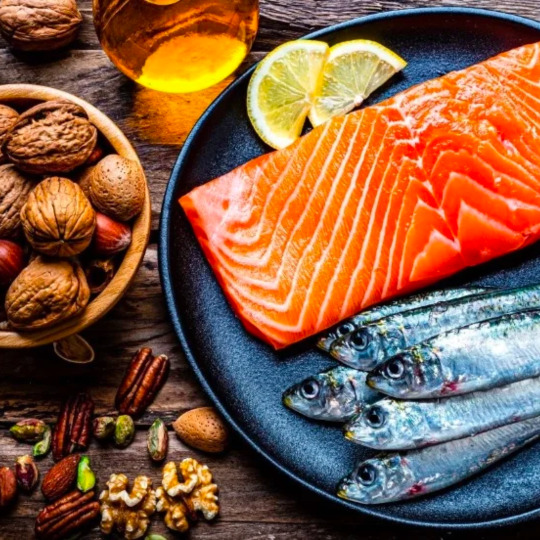
The Balanced
The key to getting the most out of omega-6 fatty acids is to consume them in moderation. The following tips can help you to achieve a healthy balance of omega-6 and omega-3 fatty acids in your diet:
Choose healthy sources of omega-6 fatty acids, such as walnuts, almonds, and flaxseeds. These foods contain a type of omega-6 fatty acid called alpha-linolenic acid (ALA), which is less inflammatory than other types of omega-6 fatty acids.
Limit your intake of processed foods, which are often high in unhealthy omega-6 fatty acids.
Increase your intake of omega-3 fatty acids, which can help to reduce inflammation. Good sources of omega-3 fatty acids include fatty fish, such as salmon, tuna, and mackerel, as well as flaxseeds and chia seeds.
Aim for a ratio of omega-6 to omega-3 fatty acids of 4:1 or less. This can be difficult to achieve with the typical Western diet, but it is important to make an effort to get as close as possible.
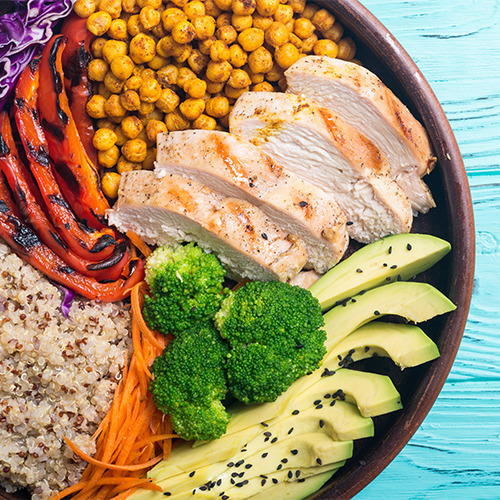
Additional Tips
Here are some additional tips for reducing your intake of omega-6 fatty acids and increasing your intake of omega-3 fatty acids:
Cook with healthy oils, such as olive oil or avocado oil.
Avoid fried foods.
Eat more whole foods, such as fruits, vegetables, nuts, and seeds.
Choose grass-fed beef and lamb instead of grain-fed beef and lamb.
Take an omega-3 supplement if you don't eat fatty fish regularly.
By following these tips, you can help to ensure that you are getting a healthy balance of omega-6 and omega-3 fatty acids in your diet.
Conclusion
Omega-6 fatty acids are an essential part of a healthy diet. However, it is important to consume them in moderation and to balance your intake with omega-3 fatty acids. By following the tips above, you can help to ensure that you are getting the most out of omega-6 fatty acids and reducing your risk of chronic diseases.

How Omega-6 Fatty Acids Affect Your Mood (And What You Can Do About It)
Omega-6 fatty acids are polyunsaturated fatty acids that are essential for human health. They are found in a variety of foods, including vegetable oils, nuts and seeds, fatty fish, and meat and poultry. Omega-6 fatty acids play a role in many important bodily functions, including cell growth, inflammation, and hormone production.
There is growing evidence that omega-6 fatty acids may also play a role in mood. For example, one study found that people with higher levels of omega-6 fatty acids in their blood were more likely to experience symptoms of depression and anxiety. Another study found that taking omega-6 fatty acid supplements improved mood in people with depression.
The exact mechanism by which omega-6 fatty acids affect mood is not fully understood. However, it is thought that they may do so by:
* Affecting the production of neurotransmitters, such as serotonin and dopamine
* Reducing inflammation in the brain
* Promoting the growth and repair of nerve cells
It is important to note that the research on the relationship between omega-6 fatty acids and mood is still ongoing. More research is needed to determine the optimal intake of omega-6 fatty acids for mood health.
However, there are some things you can do to make sure you are getting a healthy balance of omega-6 fatty acids in your diet:
* Choose plant-based oils that are high in monounsaturated fats, such as olive oil and avocado oil.
* Limit your intake of processed foods, which are often high in omega-6 fatty acids and inflammatory ingredients.
* Eat plenty of fruits, vegetables, and whole grains.
* Include fatty fish in your diet at least two times per week.
* Consider taking an omega-3 fatty acid supplement. Omega-3 fatty acids can help to balance the effects of omega-6 fatty acids in the body.
If you are concerned about your mood or mental health, talk to your doctor. They can help you to assess your diet and lifestyle and make recommendations to improve your overall health and well-being.
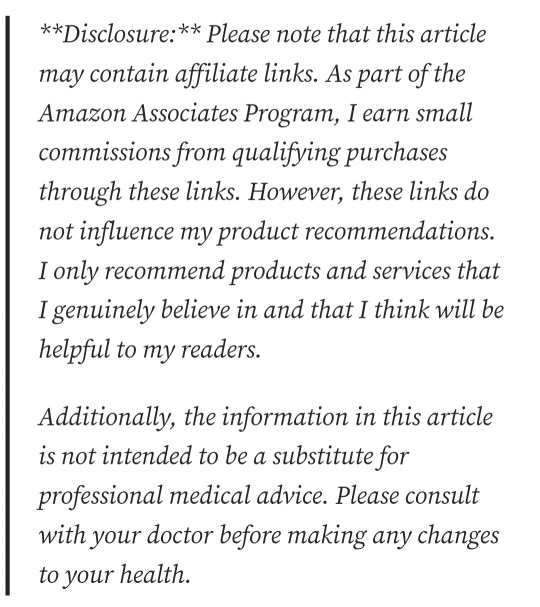
#healthy#health#healthcare#help#headlines today news#headline news#self healing#heartbreak#healthy diet#trends#natural remedy#long reads#reading#education#weight loss diet#world news#black and white#world#writing#latest news#business news#nutritious#breaking news#nature#news#money#antioxidants#science#diet plan#low cal diet
3 notes
·
View notes
Text
Superfoods in Indian Diet; right from your kitchen
One of the best things about living in India is its food and the culinary heritage that we experience in every meal that we consume. No wonder; back in medieval times, India was the world’s most sought-after country due to its treasure of spices, hidden from the rest of the world. To the present day, the culinary diversity that we find in India cannot be found anywhere else in the world. However, despite having a plethora of food options that are readily and easily available, we often find ourselves purchasing inexpensive, imported alternatives.
There is a long list of food items that are so affordable that they can be found in every Indian household, yet they are inexpensive and often a luxury overseas, such as in the US. The list includes spices such as turmeric, cardamom, and ashwagandha (15x more expensive), grains such as millets and black gram (10x more expensive), and fruits and vegetables such as guava and jackfruit (20x more expensive). Without waiting any further, let’s learn about the Desi superfoods that you can add to your diet based on their affordability and availability.
Everyday Nutritional Powerhouses: Here, we will talk about the superfoods that are not only affordable but also readily available in our households.
Dal (lentils): Packed with some protein, fiber, and many essential minerals, dal is indeed a staple for a reason. You can explore diverse varieties like moong, masoor, tur, urad, and more for different nutritional benefits.
Leafy Greens: Do not try to underestimate the power of palak (spinach), methi (fenugreek), and sarson (mustard greens). Not only are these loaded with vitamins, minerals, and antioxidants, but they also boost your immunity in the chilling winter season.
Seasonal Fruits: Embrace the abundance of papaya, bananas, guavas, and oranges to fuel your body with vitamins and natural sugars.
Spices: We might know them as spices that add flavor to our meals; spices such as turmeric, ginger, garlic, and chili peppers are more than just flavor enhancers. They are anti-inflammatory powerhouses with many health benefits, such as regulating blood pressure and playing a major role in the prevention and treatment of various cancer types.
Yogurt: It is a natural source of probiotics for gut health, calcium for strong bones, and protein for muscle development. It can be consumed plain, flavored, or even with fruits.
Nourishing Yet Special: This category will include superfoods that are not as easily found in households like the ones mentioned above, yet they are hidden gems that carry more nutrients than you can take.
Millets: Ragi (finger millet), bajra (pearl millet), and jowar (sorghum) are some of the gluten-free grains that are rich in protein, fiber, and certain micronutrients. They’re most commonly used in rotis, dosas, or porridge.
Nuts & Seeds: Chia seeds, flaxseeds, and pumpkin seeds are packed with nutrients such as omega-3 fatty acids, essential minerals, and protein. You can soak them in water overnight before consuming them or directly sprinkle the seeds on your salads, yogurt, or porridge.
Amla (Indian Gooseberry): One of our top favorite superfoods, amla is a vitamin C powerhouse that boosts immunity, aids in digestion, and comes with anti-inflammatory properties. You can enjoy it raw, pickled, or in the form of juice.
Coconut: Another superfood like the Indian gooseberry, coconut water is the hub of electrolytes, while its flesh has healthy fats and fiber. While it grows in the south, coconut can be found easily in the northern regions of India. Although it is mostly consumed raw, coconut’s nectar and flesh also make it a key ingredient in various South Indian dishes.
Jackfruit: This versatile vegetable can be enjoyed unripe or ripe. Ripe jackfruit offers antioxidants and vitamins, while unripe jackfruit provides a meaty texture in vegetarian dishes.
Exquisite and Rare Nutritional Delights: Last but not least, this category will take you through some of the rare, expensive superfoods that are worth every penny that you spend on them.
Saffron: Found in the northernmost region of India, i.e., Kashmir, saffron adds a luxurious touch to many dishes and drinks while boasting anti-inflammatory and mood-boosting properties. Due to its scarcity, saffron is one of the most duplicated superfoods. Purchase saffron only from a reliable dealer.
Black Rice: A nutty-flavored rice rich in antioxidants and fiber and known for its longevity-promoting properties.
Ashwagandha: This powerful herb is an adaptogen that helps the body manage stress and improve stamina.
In the big picture, embracing India's diverse superfoods offers a treasure trove of health benefits while remaining kind to your wallet. From readily available lentils and greens to hidden gems like millets and amla, these culinary powerhouses pack a punch of nutrients without the hefty price tag of imported trends. So, explore the vibrant flavors of India, nourish your body with local abundance, and discover that superfoods don't have to be exotic or expensive.
To learn more about health and diet, follow us on https://freshwey.in/blogs/news
5 notes
·
View notes
Text
What Does Your Skin Actually Need? A Guide to Healthy and Radiant Skin
By Dr. Olivia Grant
The skin, being the body's largest organ, plays a crucial role in protecting our internal systems, regulating body temperature, and acting as a barrier against harmful external factors. As humans, we have a natural inclination to keep our skin healthy and attractive, not only for vanity's sake but also to reflect our overall well-being. This article aims to delve into what our skin truly needs to maintain optimal health and radiance, while also exploring the evolutionary reasons behind our fascination with skin and its impact on attractiveness.
Understanding the Skin:
Before diving into the needs of the skin, it's essential to understand its structure. The skin consists of three layers: the epidermis, dermis, and hypodermis. The outermost layer, the epidermis, acts as a protective barrier, while the dermis contains vital structures such as blood vessels, hair follicles, and sweat glands. The hypodermis provides insulation and stores energy.
Hydration: The Key to Healthy Skin:
One of the fundamental needs of the skin is proper hydration. Adequate moisture ensures that the skin remains supple, prevents dryness, and minimizes the appearance of fine lines and wrinkles. To maintain optimal hydration, it is crucial to drink an adequate amount of water daily. Additionally, using moisturizers and skincare products with humectants, such as hyaluronic acid, can help attract and retain moisture in the skin.
Cleansing and Protection:
Keeping the skin clean is vital for maintaining its health. Regular cleansing helps remove dirt, oil, and environmental pollutants that can clog pores and lead to skin issues like acne. However, it's essential to strike a balance, as over-cleansing or using harsh cleansers can strip the skin of its natural oils, leading to dryness and irritation.
Furthermore, protecting the skin from overexposure to UV rays is of utmost importance. Sun exposure is a significant contributor to premature aging, pigmentation, and an increased risk of skin cancer. To protect your skin effectively, it is advisable to take certain precautions such as wearing protective clothing made of cotton, including wide-brimmed hats, and avoiding direct sunlight during peak hours.
Nutrition and Skin Health:
The condition of our skin is closely linked to our overall nutrition. A balanced diet rich in vitamins, minerals, antioxidants, and essential fatty acids is essential for maintaining healthy skin. Foods like fruits, vegetables, whole grains, lean proteins, and healthy fats provide the necessary nutrients to support skin health and repair.
Vitamins and Minerals: Several vitamins and minerals play a crucial role in skin health. Vitamin C aids in collagen production and helps protect the skin from oxidative stress. Vitamin E acts as an antioxidant and supports skin hydration. Zinc contributes to wound healing and helps regulate sebum production, while selenium and copper are vital for maintaining the skin's integrity.
Antioxidants: Antioxidants help protect the skin from free radicals, unstable molecules that can damage cells and accelerate aging. Antioxidant-rich foods include berries, leafy greens, citrus fruits, and green tea.
Essential Fatty Acids: Omega-3 and omega-6 fatty acids are crucial for maintaining the skin's integrity and preventing inflammation. Sources of these fatty acids include fatty fish, flaxseeds, chia seeds, and walnuts.
Lifestyle Factors:
In addition to external skincare practices and nutrition, certain lifestyle factors significantly impact skin health. These include:
Quality Sleep: Inadequate sleep can lead to dull and lackluster skin. Aim for 7-9 hours of quality sleep each night to allow the skin to repair and regenerate.
Stress Management: Chronic stress can trigger inflammatory skin conditions and accelerate the aging process. Engaging in stress management techniques such as exercise, meditation, deep breathing exercises, and pursuing hobbies can help reduce stress levels and promote healthier skin.
Regular Exercise: Physical activity improves blood circulation, which delivers oxygen and nutrients to the skin cells, giving your complexion a healthy glow. It also promotes the production of collagen, which keeps the skin firm and supple.
Avoiding Smoking and Excessive Alcohol Consumption: Smoking reduces blood flow to the skin, depriving it of essential nutrients and oxygen. It also damages collagen and elastin, leading to premature wrinkles and sagging. Excessive alcohol consumption can dehydrate the skin and contribute to inflammation.
Evolutionary Perspectives on Skin and Attractiveness:
Humans have evolved to analyze each other's skin to determine health and attractiveness. Clear, radiant skin has been associated with good overall health, as it indicates proper hydration, nutrition, and a lack of underlying health issues. Evolutionarily, selecting a mate with healthy skin would have been advantageous for reproductive success and passing on good genes to offspring.
Our fascination with skin and attractiveness is deeply ingrained, and this has influenced societal beauty standards throughout history. However, it's important to note that true beauty encompasses a wide range of skin types and tones, and embracing diversity is crucial for promoting inclusivity and self-acceptance.
Caring for our skin goes beyond vanity; it is essential for our overall health and well-being. By understanding the needs of our skin and providing it with proper hydration, protection, nutrition, and lifestyle care, we can maintain its health, radiance, and youthful appearance. Additionally, recognizing the evolutionary reasons behind our fascination with skin can help us appreciate the diverse beauty that exists and promote a more inclusive perspective on attractiveness. So, let's prioritize our skin's needs and embrace the skin we're in, knowing that it reflects our inner and outer vitality.
_________________________________________________________
Dr. Olivia Grant is a renowned dermatologist and skincare expert with a passion for helping individuals achieve healthy, radiant skin. With over two decades of experience in the field, Dr. Grant has become a trusted authority in skincare and is dedicated to educating people about the science behind skincare and its impact on overall well-being.
Dr. Grant completed her medical degree at the prestigious Stanford University School of Medicine, where she developed a fascination for the intricate workings of the skin. She went on to specialize in dermatology and pursued advanced training in cosmetic dermatology, focusing on the latest advancements in skincare treatments and technologies.
Throughout her career, Dr. Grant has published numerous research articles in leading dermatological journals and has been invited to speak at international conferences. She believes in a holistic approach to skincare, emphasizing the importance of understanding the unique needs of each individual's skin and tailoring treatment plans accordingly.
As a firm believer in the power of education, Dr. Grant actively engages in community outreach programs, conducting workshops and seminars to promote skin health awareness. She is also a regular contributor to popular beauty and lifestyle magazines, sharing her expertise and debunking skincare myths.
When Dr. Grant is not busy seeing patients or conducting research, she enjoys exploring nature, practicing yoga, and experimenting with new skincare formulations in her private lab. Her ultimate goal is to empower individuals to make informed decisions about their skin, helping them unlock their natural beauty and confidence.
Through her comprehensive understanding of the skin and her passion for scientific advancements, Dr. Olivia Grant continues to inspire and guide individuals on their journey towards healthy, glowing skin.

#radiant skin#glowing skin#skincare tips#skin care#skin treatment#skincare#natural skin care#skincare routine#beauty tips#antiaging#acne#organic skin care#beauty#beauty products#skincareproducts#natural skin care products#healthy skin#beautyproducts#healthy life#healthy lifestyle#healthy life choices#healthy living#healthy life expectancy#healthy life happy life#healthy habits#healthy life changes#health tips
6 notes
·
View notes
Text
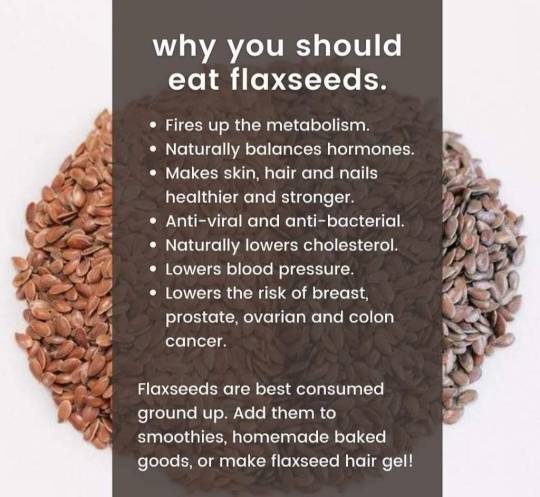
Flaxseeds have been consumed for over 6,000 years. These magical seeds contain anti-inflammatory omega-3 fatty acids and other antioxidants that naturally promote hormonal balance, and improve digestion, strengthen hair and nails, and even fight cancer!
Flaxseeds are small seeds, often called Lin seeds, that are a great source of dietary fiber and other minerals like manganese and magnesium. They’re also a great source of plant-based protein.
We love adding flaxseeds to baked goods, smoothies, and even to our homemade hair gel/treatment mask (recipe is on my page). I’d recommend grinding them up (instead of eating them whole) to reap the most benefits.
Do you eat flaxseeds often? How do you use them?
7 notes
·
View notes
Text
Top Lung Health Tips from Leading Pulmonologists in Navi Mumbai
Breathing is something we all do without thinking. But have you ever thought about how important it is to take care of your lungs? Your lungs work hard every day to keep your body running. Just like we take care of our heart and other organs, it is equally important to keep our lungs healthy.
Pulmonologists – doctors who specialize in lung health – in Navi Mumbai have shared valuable tips to help you maintain strong, healthy lungs throughout your life. Whether you’re young or old, these habits can make a big difference in your breathing and overall well-being.
1. Quit Smoking – It’s Never Too Late
Smoking is the leading cause of lung diseases like chronic obstructive pulmonary disease (COPD), lung cancer, and asthma. The harmful chemicals in cigarettes damage your lungs over time, making it harder to breathe and reducing oxygen levels in the body.
If you smoke, quitting is the best thing you can do for your lungs. Even if you’ve smoked for years, stopping now can still bring major benefits. Within weeks of quitting, lung function begins to improve, and the risk of lung-related illnesses decreases.
2. Avoid Secondhand Smoke and Polluted Air
Even if you don’t smoke, exposure to secondhand smoke is dangerous. It contains many of the same harmful chemicals and can affect your lungs just as much. Stay away from places where smoking is common, and encourage your loved ones to avoid smoking indoors.
In cities like Navi Mumbai, air pollution is a growing concern. Dust, car exhaust, and construction debris can all irritate your lungs. On days with high pollution, try to stay indoors, use air purifiers, and wear a mask if you must go outside.
3. Stay Active and Exercise Regularly
Physical activity not only strengthens your heart and muscles but also improves lung capacity. When you exercise, your breathing rate increases, helping your lungs work more efficiently.
You don’t need a gym membership – walking, cycling, swimming, or yoga can all help. Just 30 minutes a day of moderate activity can boost your lung function and energy levels. If you have breathing issues, speak with a lung specialist before starting a new workout routine.
4. Practice Deep Breathing
Most people breathe shallowly, using only a small portion of their lungs. Deep breathing exercises can help you strengthen your lungs, reduce stress, and increase oxygen flow in the body.
Try this simple method:
Sit or lie down comfortably
Inhale deeply through your nose for 4 seconds
Hold your breath for 2 seconds
Exhale slowly through your mouth for 6 seconds
Repeat this 5-10 times daily. Over time, this will improve your lung flexibility and make breathing feel easier.
5. Prevent Lung Infections
Lung infections such as the flu, pneumonia, and COVID-19 can cause serious complications, especially in older adults and those with pre-existing lung conditions.
Here’s how to protect yourself:
Wash your hands regularly
Get annual flu shots and recommended vaccines
Avoid close contact with sick individuals
Wear a mask in crowded or high-risk areas
Stay home and rest if you feel unwell
If you experience symptoms like a persistent cough, fever, chest pain, or trouble breathing, don’t ignore them. Consult a doctor immediately.
6. Maintain a Clean Indoor Environment
Many lung irritants are found inside our homes – such as mold, dust, pet dander, and chemical cleaners. Keeping your living space clean and well-ventilated helps reduce exposure to these triggers.
Try using natural cleaning products, clean air filters regularly, and ensure there is enough fresh air coming in. If you have asthma or allergies, using a dehumidifier and HEPA filters can also help.
7. Follow a Healthy Diet
What you eat can also affect your lungs. A balanced diet supports the immune system and helps prevent inflammation. Include foods rich in:
Vitamin C – oranges, bell peppers, berries
Omega-3 fatty acids – flaxseeds, walnuts, fish
Antioxidants – green leafy vegetables, tomatoes
Water – keeps mucus in the lungs thin and easy to clear
Avoid too much salt, sugar, and processed food, which can lead to inflammation and weaken immunity.
8. Go for Regular Check-ups
Many lung conditions show no early symptoms. Regular health check-ups can catch problems before they become serious. If you have a history of breathing issues, allergies, or if you live in a high-pollution area, routine visits to a pulmonologist are highly recommended.
Early detection of diseases like asthma, bronchitis, or even lung cancer can save lives and improve your quality of life.
Conclusion
Your lungs are one of the most vital parts of your body, yet they are often taken for granted. By following these simple yet powerful tips from leading pulmonologists in Navi Mumbai, you can help protect your lungs and enjoy better health for years to come.
If you’re experiencing breathing difficulty, chest discomfort, or a long-lasting cough, don’t wait. Schedule a consultation with a lung specialist to get the right care at the right time. Kokilaben Hospital in Navi Mumbai offers advanced diagnostics and personalized treatment for all lung-related conditions.
0 notes
Text
Superfoods for Longevity: What to Eat for Optimal Health

In today’s fast-paced world, the path to longevity isn’t found in a magic pill—it’s grown in the soil, picked from trees, and served on your plate. Nutrition plays a pivotal role in how well we age, and incorporating the right superfoods into your daily routine can help extend both your lifespan and your healthspan—the number of years you feel truly alive and thriving.
At Prime Vitality, Dr. Shiv Goel—a trusted expert in holistic and functional medicine—believes that food is far more than fuel. It’s a powerful tool to reduce inflammation, support cellular health, and keep chronic diseases at bay. Let’s explore the top superfoods that can help you live longer, feel younger, and enjoy optimal health.
1. Blueberries – Tiny but Mighty
These antioxidant-rich berries are known for their ability to fight free radicals, support brain function, and reduce DNA damage linked to aging. They’re also anti-inflammatory and may lower the risk of heart disease and cancer.
2. Leafy Greens – Nature’s Multivitamin
Spinach, kale, and Swiss chard are packed with vitamins, minerals, and fiber. Regular consumption supports healthy vision, bone strength, and detoxification. Dr. Goel often recommends these to clients as daily staples for long-term wellness.
3. Fatty Fish – Omega-3 Powerhouse
Salmon, sardines, and mackerel are rich in omega-3 fatty acids, which support cardiovascular health, reduce cognitive decline, and ease joint pain. Omega-3s are key players in slowing the aging process at a cellular level.
4. Nuts & Seeds – The Longevity Snack
Almonds, walnuts, flaxseeds, and chia seeds are rich in healthy fats, protein, and antioxidants. They help manage cholesterol, reduce inflammation, and even support hormone balance—making them an ideal addition to a longevity-focused diet.
5. Fermented Foods – Gut Health Boosters
Yogurt, kefir, kimchi, sauerkraut, and miso are full of probiotics that promote a healthy microbiome. Since gut health is directly linked to immune strength and mental clarity, these foods are a must in Dr. Goel’s functional nutrition protocols.
6. Turmeric – The Golden Healer
Curcumin, the active compound in turmeric, has powerful anti-inflammatory and antioxidant properties. It’s been shown to protect against heart disease, arthritis, and even age-related brain disorders like Alzheimer’s.
7. Avocados – Healthy Fat Hero
Loaded with heart-healthy monounsaturated fats, fiber, potassium, and vitamins, avocados support heart and brain health. They also help your body absorb nutrients from other plant-based foods.
How Dr. Shiv Goel Helps You Create a Longevity-Boosting Lifestyle
At Prime Vitality Wellness, Dr. Shiv Goel uses comprehensive diagnostics and personalized nutrition plans to help patients integrate these superfoods into their daily lives in a way that’s sustainable and enjoyable. Whether you’re struggling with chronic fatigue, inflammation, or digestive issues, your diet is one of the first and most powerful tools we’ll optimize.
Dr. Goel’s approach is rooted in functional medicine, which means he doesn’t just treat symptoms—he uncovers root causes and builds wellness from the ground up.
Live Long, Live Well — With Prime Vitality
You don’t need to wait for illness to begin making better choices. You can start nourishing your body for longevity today. The secret to aging gracefully isn’t locked in a supplement bottle—it’s on your plate, in your habits, and within reach.
🌿 Start Your Journey to Vital Longevity Today!
Book your personalized wellness consultation with Dr. Shiv Goel at Prime Vitality and discover a food-first, holistic path to a longer, healthier life.
0 notes
Text
Here are practical, science-backed tips to improve your skin health:
🧼 1. Cleanse Gently but Consistently
Use a mild, sulfate-free cleanser twice a day to remove dirt, oil, and pollutants without stripping your skin’s natural barrier.
💧 2. Moisturize Daily
Hydration is key—use a moisturizer suited to your skin type (gel for oily, cream for dry) to lock in moisture and support skin repair.
🧴 3. Wear Sunscreen—Every Day
It protects against premature aging, sunspots, and skin cancer—even on cloudy days or indoors with screen exposure.
🍽️ 4. Eat Skin-Friendly Foods
Load up on:
Omega-3s (like walnuts, flaxseed, salmon)
Antioxidants (berries, spinach, green tea)
Vitamin C & E (citrus, almonds, avocados) And drink plenty of water!
💤 5. Sleep 7–9 Hours a Night
Skin regenerates during sleep. A consistent sleep schedule reduces puffiness, dullness, and under-eye circles.
🚫 6. Ditch Smoking & Limit Alcohol
Smoking breaks down collagen and elastin; alcohol dehydrates and inflames skin. Cut down for a clearer, more radiant complexion.
😌 7. Manage Stress
Stress spikes cortisol, leading to breakouts and irritation. Try deep breathing, yoga, or journaling regularly.
🧖 8. Exfoliate—But Don’t Overdo It
1–2 times a week is enough to remove dead skin cells, unclog pores, and reveal a smoother, brighter complexion.
🔄 9. Be Consistent with Skincare
It takes 4–6 weeks to see noticeable changes. Stick to your routine, and resist the urge to try too many new products at once.
🧬 10. Know Your Skin Type
Choose products and routines that align with your skin—oily, dry, combination, sensitive, or acne-prone.
0 notes
Text
Glowing Skin Secrets from a Top Skin Doctor in Patna

All of us dream of clear, healthy, and glowing skin. But nowadays, with busy schedules, pollution, stress, and unhealthy lifestyles, it is tough to enjoy healthy skin. The people staying in cities such as Patna get additional drawbacks due to hot and cold climates, dust, and pollution. Nonetheless, even for you, with the proper expert guidance, there is always hope for attaining glowing skin. Consulting a trusted skin physician in Patna will lead you on the right track towards glowing skin.
Here, we’ll share valuable skin care tips and professional secrets recommended by top skin specialists. These tips are easy, straightforward, and effective for anyone who wishes to have naturally radiant skin.
Why is Healthy Skin So Important?
Your skin is your body's largest organ. It protects you from infection, harmful ultraviolet rays, and external dangers. More than your appearance, healthy skin is an indication of your general state of being. When you look after your skin, you feel more confident and relaxed.
As per a top dermatologist in Patna, keeping your skin healthy avoids universal issues such as acne, rashes, pigmentation, and even life-threatening infections. Knowing what your skin type is and adopting the correct skincare regimen is the key to getting radiant skin.
Common Skin Problems People Face
Patna's hot summer, high humidity, and rising levels of pollution tend to create many skin problems. Some of the most common issues for people in Patna are:
Dark Spots and Pigmentation: Sun exposure and pollution.
Dry or Oily Skin: Weather change and insufficient skincare.
Eczema and Skin Allergies: Due to environmental factors and pollutants.
Premature Aging: Fine lines, wrinkles, and sagging skin due to sun exposure and lifestyle.
Visiting a dermatologist in Patna can easily cure these conditions. They can give personalized treatments and recommend proper skin care.
Morning and Night Skincare Routine for Glowing Skin
A skincare routine is not necessarily complicated. Consistency will suffice. Some simple steps that a dermatologist in Patna recommends for skin glow are:
1. Wash Your Face Twice Daily
Clean your face every morning and before sleeping. Cleanse with a gentle, soap-free face wash to remove dirt, oil, and filth. Harsh soap will dry your skin and irritate.
2. Moisturize Often
Oily skin has the general illusion that it doesn't require moisturizer, but it is a myth. Oily skin requires hydrating as well. Apply a light, oil-free moisturizer that is suggested by a Patna skin doctor to maintain your skin soft and supple.
3. Always wear sunscreen
Sun protection is required. Even on cloudy days. UV rays can damage your skin, leading to tanning, dark spots, wrinkles, and even skin cancer. Use a broad-spectrum sunscreen with SPF 30 or higher every day.
4. Exfoliate Once or Twice a Week
Exfoliating removes dead skin cells, giving your skin a fresh and bright appearance. But don't overdo it. A gentle exfoliator applied once or twice a week is sufficient to show off radiant skin.
5. Drink Lots of Water
Hydration is essential for healthy skin. Drinking a minimum of 8-10 glasses of water daily keeps your skin hydrated from the inside, avoiding dryness and dullness.
Skin Care Tips from a Skin Specialist in Patna for Healthy Skin
What you consume reflects on your skin. A balanced and healthy diet can do miracles. The following are some dietary recommendations from a top skin expert in Patna:
Fruits and vegetables: Full of vitamins, minerals, and antioxidants that can feed your skin.
Healthy fats: Omega-3 fatty acids in fish, nuts, and flaxseeds keep your skin soft and radiant.
Reduce Sugar and Junk Food: Excess sugar can lead to acne and early aging.
Green Tea: Renowned for being anti-inflammatory, it helps keep your skin clean and healthy.
Healthy Lifestyle Habits for Better Skin
Besides diet and skincare, your daily habits play a significant role in your skin's health. Some of the lifestyle modifications suggested by a skin expert in Patna are as follows:
Take Sufficient Rest: Lack of sleep can cause puffy eyes, dark circles, and dull skin. Sleep for 7-8 hours daily.
Reduce Stress: Stress causes skin problems like acne and eczema. Do yoga, meditation, or light physical exercise to manage stress.
Avoid Smoking and Restrict Alcohol: Smoking and alcohol dry out the skin and speed up aging. Giving up these habits will do wonders for your skin health.
When to Consult a Skin Doctor in Patna?
Although home treatment is essential, some of the skin issues need specialized attention. You must visit a skin expert in Patna if you have:
Chronic acne that fails to respond to over-the-counter products.
Severe dryness, itchiness, or rashes.
Unexplained pigmentation or dark spots.
Early aging signs, such as fine lines and wrinkles.
Hair loss and scalp problems.
A professional dermatologist in Patna will be able to detect the problem and recommend treatments like:
Chemical Peels: To eliminate dead skin cells and enhance skin color.
Laser Treatments: For the removal of scars, pigmentation problems, and hair removal.
Medications and Topical Medications: For infections, acne, eczema, and other skin conditions.
Recommended Skin Specialist in Patna: Dr. Abhijeet Kumar Jha
If you are looking for a skilled and experienced skin doctor in Patna, Dr. Abhijeet Kumar Jha is a popular name in the city of dermatologists. With years of experience, Dr. Jha provides cutting-edge skin and hair treatment at his clinic, which is one of the top skin clinics in Patna.
Dr. Abhijeet Kumar Jha believes in realizing the patient's specific skin problems and offering individualized solutions through innovative technology. It may be acne, pigmentation, anti-aging treatment, or solutions to hair fall, but he provides effective and safe solutions to his patients.
Conclusion
Glowing skin isn't all about applying costly products; it's about adopting a healthy lifestyle, having a good skincare regimen, and consulting an expert skin doctor when necessary. With proper advice from a reliable skin doctor in Patna, you can get the healthy and glowing skin you have always dreamed of.
Remember: skin care is a journey, not a magical cure-all. Be patient. Be routine. And whatever you do, do not forget to consult a skin specialist in Patna if you experience any trouble with your skin. Professional care, in conjunction with proper care, can keep you looking beautiful, with glowing skin, for many years to come.
#skin doctor in patna#hair loss treatment in patna#best skin doctor in patna#skin physician in Patna
0 notes
Text

Omega-3 fatty acids are essential nutrients that offer numerous health benefits for your body and brain. They are crucial for proper brain function and growth development, and they play a significant role in cardiovascular health, reducing the risk of heart disease and stroke by lowering triglyceride levels and blood pressure.
Omega-3s can also help reduce inflammation, which is linked to chronic illnesses such as heart disease and cancer.
They may improve blood sugar levels and reduce the risk factors associated with metabolic syndrome, including high blood pressure and high triglycerides.
In addition to cardiovascular benefits, omega-3s are beneficial for mental health. Regular consumption of omega-3s is associated with a reduced risk of depression and anxiety.
They may also help alleviate symptoms of ADHD in children, although more research is needed to confirm these effects.
Omega-3 fatty acids are found in various foods, including fatty fish like salmon and mackerel, as well as plant sources such as flaxseeds and chia seeds. The American Heart Association recommends consuming at least two servings of fish per week, with one being an oily fish, to reap the health benefits of omega-3s.
0 notes